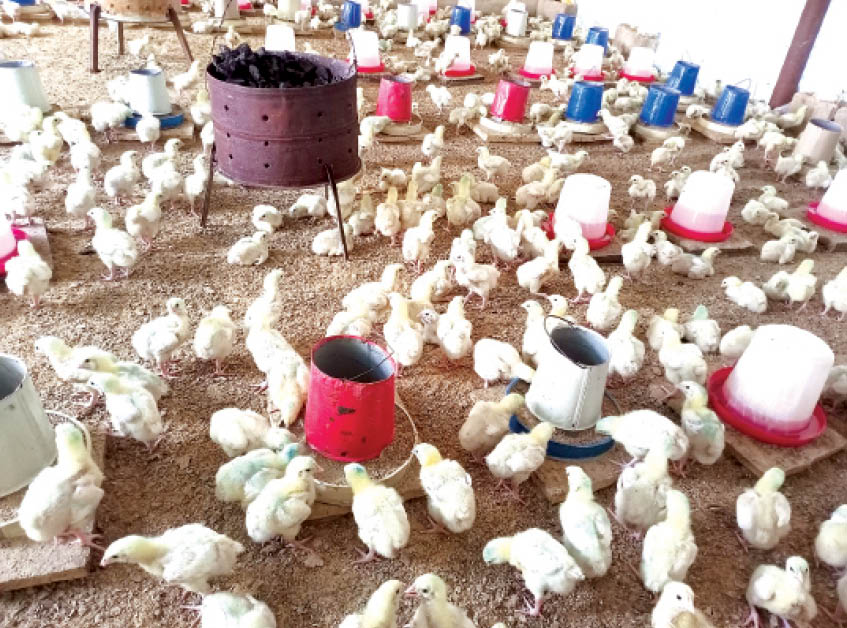How farmers’ cooperative is revamping moribund farms
Unlike many farmers’ cooperatives, Dodeka Multipurpose Cooperative (DMC), which has members from different professional backgrounds, is delving into something unique; taking over management of farms that have collapsed, to inject new life and revamp them for optimal production. Daily Trust visited one of such farms at Sabon Gida along the Keffi-Lafia Highway and thereafter parleyed […]

The Broilers section of one of the revamped farms
Unlike many farmers’ cooperatives, Dodeka Multipurpose Cooperative (DMC), which has members from different professional backgrounds, is delving into something unique; taking over management of farms that have collapsed, to inject new life and revamp them for optimal production.
Daily Trust visited one of such farms at Sabon Gida along the Keffi-Lafia Highway and thereafter parleyed with Mr Hassan Abdul, chairman of the cooperative, where he explained what they had put in place and were doing to overhaul the farm they took over in August.
Mr Abdul explained why the cooperative is investing in farm management: “We realised that there are quite a number of farms spread across Nigeria that are suffering from management issues. There are a lot of people who set up farms and over a period the farms go into disuse and the challenges are in either financing, marketing or administration. So we want to be able to offer that as a service for those kind of farmers, and this is the first place we are starting this particular service.
“We go into a farm management agreement with the ownership, and depending on what the agreement is (profit sharing or percentage of the revenues), we take over the farm and we help source for finance…We also look for markets for the products. Ultimately, the objective is to ensure that we are able to turn around these assets for the owners and build capacities that will make them continue to produce optimally. This is very important for our country because agriculture is the most critical way that Nigeria can get out of its economic challenges.”
He said before taking over any farm they had to run series of trials in order to understand the operating environment “because every farm project is different”, adding that there were some things that would be uniform across board, but that the environments were always different.
He explained that, “We need to understand the unique challenges that each farm will present and then find a way around; ensuring that those challenges are either eradicated fully or the risks minimised and the farm becomes profitable.”
He said as long as people had not found ways of optimising production capacities of agricultural assets, managing their farms effectively would remain very difficult because, according to him most people go into farming on a large scale and in the end run into problems of management that collapse such farms.
On the issue of funding, Mr Abdul said their strategy was not to approach banks initially, but that in the last couple of weeks they saw some openings which made them to seriously consider as a first line of approach, adding that financing for agriculture was a little bit more complicated than other sectors of the economy.
He further said insecurity remained an issue, but that the farmers have remained resolute in their pursuits.
The farm being managed currently by DMC on the Keffi-Lafia Highway sits on about 35 hectares and is a mix of livestock and crop production, with most of the facilities in place, although some in poor conditions.
Mr Abdul said, “We had to start working on them to bring them back to life. Even within the farm itself, we are activating the sections one by one so that we don’t jump into everything at once and then find it difficult to manage all of them at the same time.”
The farm has a poultry with layers and broilers for the production of eggs and meat respectively. For the fishery, the farm has four earthen ponds and five concrete ponds equipped with facilities for hatchery, as well as breeding, with a total capacity for over 20,000 fishes per circle.
Mr Abdul said, “Our plan is to raise, process and sell. For that, we have been able to build that capacity on the farm. It wasn’t part of what we inherited. So we had to set up a meat processing unit. For the processing, we intend to make the service available to other farms in the vicinity who may want to approach the market with processed meat but may not have the kind of facility needed.”
Mr Abdul told our reporter that the cooperative’s plan was to raise broilers in three circles of production after months of successful trials.
The 6,000-capacity layers’ pens stocked with battery cages is due to take off soon, including the feed mill – which is one of the areas the farm wants to explore.
The farm also has fruit trees scattered all over which include oranges, lemon, mango, pawpaw, and crops like maize and soybean.
